
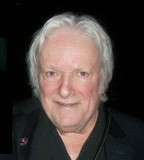
 © Copyright 2011 Rock Interviews dot com, Photos :
Chris Walter,
Neal Preston,
Patrizia Congiu, Rock-Interviews.com.
© Copyright 2011 Rock Interviews dot com, Photos :
Chris Walter,
Neal Preston,
Patrizia Congiu, Rock-Interviews.com.


 © Copyright 2011 Rock Interviews dot com, Photos :
Chris Walter,
Neal Preston,
Patrizia Congiu, Rock-Interviews.com.
© Copyright 2011 Rock Interviews dot com, Photos :
Chris Walter,
Neal Preston,
Patrizia Congiu, Rock-Interviews.com.


Interview - Dick WAGNER
Saturday 25th February 2012
Brescia - (Italy)
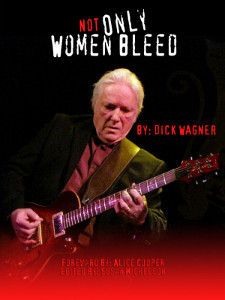
|

AEROSOL |
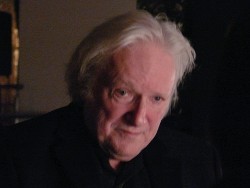
They call me The Maestro of Rock.
AM : Through this interview we are going to understand why.
OK.
AM : Do you remember when you first see and touch a guitar?
Yes, the first time I became aware of the guitar was when I was a young child,
probably 8 or 10 years old, and at christmas parties and celebrations my uncle
John would play the guitar, he was a guitar player, so I got intrigued by
the guitar then, I couldn't really follow it because they told me not to pick
it up, I may break it. I wasn't allowed to touch it, but I loved the sound.
We would sit around and sing songs and my uncle John would play, eventually
my grandmother brought the guitar over to me and she taught me three chords
because she played a little bit too and that was the first time, touching it,
probably 10 years old, first time touching it. I wanted to play so I enticed
my dad to buy me a guitar when I was sixteen, almost seventeen, so I got my first
guitar, a
Harmony acoustic guitar
for those who want to know, very difficult
to play, very beautiful little guitar but very hard to play, but I didn't let
that stop me from playing, I first learned on that guitar, even though it was
difficult to play, then I wanted an electric guitar next, so I purchased for myself,
another Harmony electric guitar, this was beautiful, it played beautiful,
the sound was great, so that was my first play on the electric guitar which
eventually would become noted for my electric guitar playing.
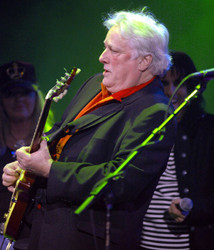
My first band was named the Invictus after that poem the invictus.
We were four guitarists, no drums, no bass, just four guitar players,
very loud, wonderful to play but I'm sure it didn't sound very good.
We had four guitar players and later, maybe a year later we added a
drummer and a bass player, and we became a more traditional type
of a rock'n'roll band.
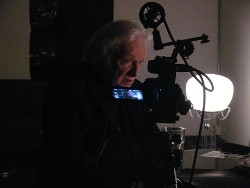
Yes, indeed.
AM : After you worked with a lot of musicians as a guitarist and songwriter, for instance
Lou Reed's band.
That's right.
Lou Reed's
Rock'n'Roll Animal.
It's kind of an historic live rock'n'roll album,
very noteworthy. It was my first real chance to play the guitar and I had to
take all the responsability for the songs and everything, because Lou had the songs,
his famous songs that he wanted to redo, remake them into a more majestic fashion.
So I became his lead guitar player and also arranger and band leader you know,
more or less to take care of the band and we had some very successful tours
and some very successful rock'n'roll albums.
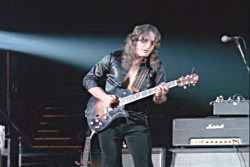
Oh yeah. I spent many years with
Alice Cooper,
you know from my first
recordings with him, I played the guitar and on some of the songs on
School's Out and then I played on every album after that up to probably
Flush the Fashion, I think I left that group around that time.
AM : And you have a very good friend with whom you played,
Steve Hunter.
Yes, Steve Hunter and I were an infamous guitar duo.
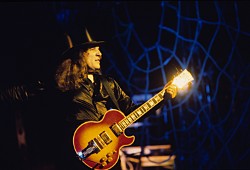
The film of Rock and Roll Animals? I think it was just to make light of Lou Reed,
who is himself self-effacing and it really ended up standing for the nature of
the band itself, because the band became more famous than Lou,
they call it a classic album.
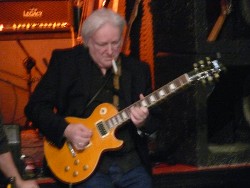
Yes, I've written songs for instance for
Meat Loaf,
Tim Curry,
Rod Stewart...
AM : What about
Peter Gabriel?
I played the guitar on Peter Gabriel's, so I didn't write songs for him,
but you know I did spend many years as a session guitar player, somebody
they would call in to write the songs and help to complete songs,
and really being involved in creating the music.
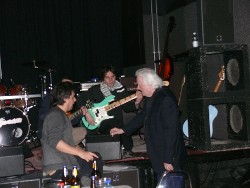
I think probably Only Women Bleed. On the other hand, there is a song
that I wrote about child abuse called Remember the Child, they are both very famous songs.
AM : In October 2009 you released a CD called Full Meltdown. Can you talk about it?
Yes. Full Meltdown was a combination, a compilation of several songs that
I had recorded in 1979. I recorded these songs in a place called the
Long View Farm studios. It was a huge farm with cattle and everything and they
put in a recording studio, with a full time working staff, they can fix you
breakfast in the morning, get you off to work and then you can see them riding
by the horses. It's very aesthetically, it's a wonderful place. But anyway we
recorded I think 7 songs then the master tape somehow left Long View Farm and went to
Atlantic records in New York City. I had had a recording deal sale with Atlantic
Records but it was over and I was no longer affiliated with them so Atlantic
ended up with the tracks, and when they serviced some of their tracks off to
other labels, all those songs of mine went to, what is it? (for the moment I
have a lack of memory). In any case I got a call from the executive of this
label mentioning that he had all these songs that I had forgotten about,
I've never done anything with them, I didn't know that they had gone to Atlantic
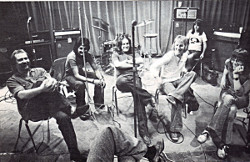 records I really had no idea where they were, and honestly at that moment
I didn't seem to really care about it, but he said he was going to release them
on this little small label, I said no, those tapes belong to me, so we ended up,
we talked, he ended sent them to me that's how I had these brand new fresh never
released recorded 1979 songs and I decided to use those plus a few more than I had
sitting on the shelf and create this Full Meltdown album. Now part of the reason it
is called Full Meltdown is the band that played with me on these tracks, the name of
the band was Meltdown, so I was just including them, honoring them, the Full Meltdown.
In any case it's good rock'n'roll, very good and I'm glad I discovered them.
records I really had no idea where they were, and honestly at that moment
I didn't seem to really care about it, but he said he was going to release them
on this little small label, I said no, those tapes belong to me, so we ended up,
we talked, he ended sent them to me that's how I had these brand new fresh never
released recorded 1979 songs and I decided to use those plus a few more than I had
sitting on the shelf and create this Full Meltdown album. Now part of the reason it
is called Full Meltdown is the band that played with me on these tracks, the name of
the band was Meltdown, so I was just including them, honoring them, the Full Meltdown.
In any case it's good rock'n'roll, very good and I'm glad I discovered them.
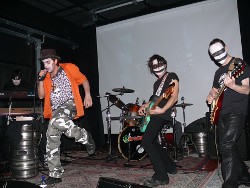
You know they say rock musicians don't have a heart, but I do. Alice Cooper and
I had written a song called Only Women Bleed, which was very famous and spoke
of domestic violence, and so when I was thinking about writing a book, because that
song is so famous, and because I believe that men are wounded also and women
definitely take the brunt of whatever you want to call domestic violence, even
mental abuse. Men also have their problems, so I tried to write this book from a
point of view of a man who's gone through his life, not just music, but the same
thing any human being would go through, a very ordinary but a pretty extraordinary
life at the same time, so I got to tackle all that and that's why I named the book.
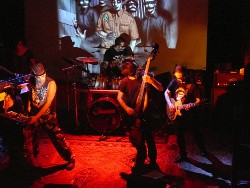
It is Desert Dreams. Dessert is a sweet you eat, and the Desert Dreams,
we live in Phoenix that area, it's in the middle of the desert, so I decided
to call it Desert Dreams. When I first moved down to Phoenix area, I was living
back East in Michigan and started to form this company, I thought of the title to be
Desert Dreams, because here I was now in the desert and a new dream you know,
start a new label, start a new company, and joining Susan Michelson who is over
there somewhere. Susan is my main co-manager with her husband, Alex Cyrell,
the two of them, my managers and we are also business partners in this publishing
company, in this record company and all the things that Desert Dreams does.
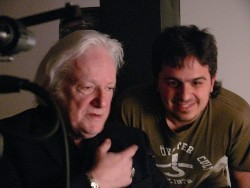
I am in Italy to produce, record, arrange and completly make a living hell
for a group called
The Mugshots, this is Mickey.
AM : Yes, Mickey from The Mugshots.
Mickey : We already know each other, we did a nice interview for
rock-interviews.com
Dick : Yes indeed, very good.
Mickey : When dreams come true, you know, when Desert Dreams come true.
I used to listen when I was fourteen, fifteen, always looking for Dick Wagner's
music inside the Alice Cooper's albums. Then when I fist met Alice Cooper,
I said you have to work again with Dick Wagner and
Bob Ezrin
and he did on the last album Welcome 2 My Nightmare, so I was pretty influential, what do you think?
Dick : Oh yeah, you made it happen. Mickey and I actually met on Facebook.
Mickey : Yeah, we met on Facebook. I started to harass this guy and then
I sent him the music, and surprisingly he said, oh I like it!...
Dick : Yes, I said I like it and then we started talking and over a period
of time we came to the decision that it would be good if I came to Brescia
and did some work with him, so I'll be here for two weeks.
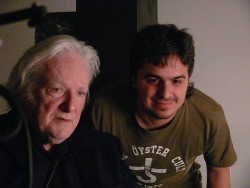 Mickey : And then the third week I'll go with Dick in Phoenix, Arizona to do the mixing,
and it's a complete honour. And we will also do a song by Dick and Alice Cooper,
Pass The Gun Around, which is in my opinion the best Alice Cooper song ever, plus some surprises.
Mickey : And then the third week I'll go with Dick in Phoenix, Arizona to do the mixing,
and it's a complete honour. And we will also do a song by Dick and Alice Cooper,
Pass The Gun Around, which is in my opinion the best Alice Cooper song ever, plus some surprises.
Dick : Yes we have some. Mickey and I have written several of these songs together.
Mickey : Co-written several songs.
Dick : And they turned out just beautifully, he has such great ideas,
so this will really be a total pleasure.
AM : So we wish you the best and thank you very much for your time Dick.
You're welcome, thank you very much, you did a beautiful interview.
AM : Thank you.
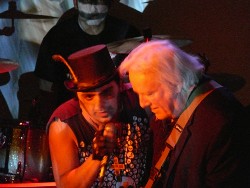
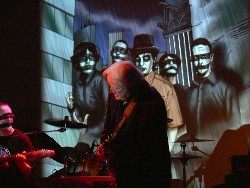
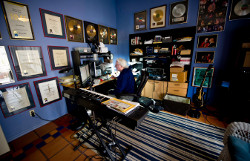
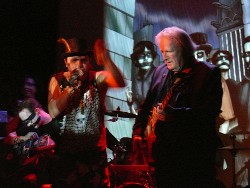
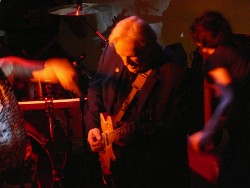
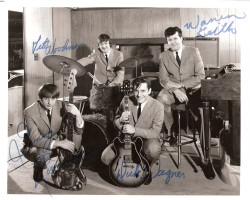
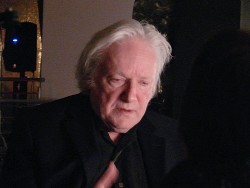

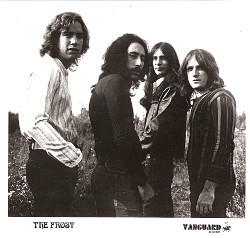
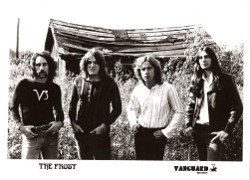
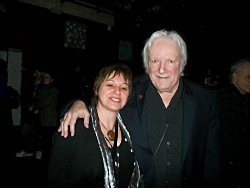
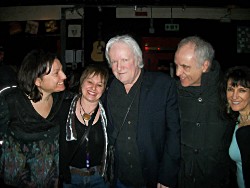
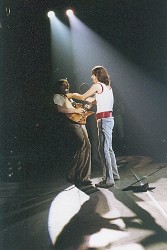

|

AEROSOL |